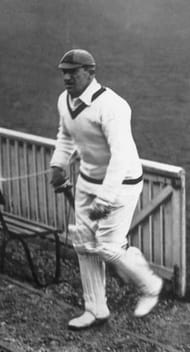The 1910s:

Aubrey Faulkner (SA)
While the First World War saw international cricket go on hiatus for the latter half of the 1910s, there were still many fantastic players who graced the Test cricket arena during this time.
Amongst them were the likes of Jack Hobbs, Frank Woolley, Clem Hill and Sydney Barnes. These are all players still celebrated today, yet none were as important to their countries as Aubrey Faulkner was for South Africa.
Similar to Willie Bates, Faulkner didn't have the obvious talent that other players of his generation possessed. Faulkner began his domestic career as a lower order batsman who would occasionally bowl some medium pace. He was functional, but nothing more.
Yet Faulkner had the fortune of being mentored by Reggie Schwarz, a man who had devised a mythical delivery that would become known as "The Googly". Schwarz taught Faulkner how to bowl his new delivery and subsequently set Faulkner upon the path that would see him become arguably the greatest allrounder in history.
Faulkner's beginnings in Test cricket saw him play mainly as a bowling-allrounder, fooling some of the best batsmen with Schwarz's mystery ball. But come the 1910s, his batting had developed to the point where it perhaps even surpassed his bowling.
The 1910-11 series South Africa played in Australia epitomized this, as Faulkner made 732 runs in five matches against a strong Australian side. Faulkner's batting contributions accounted for 26.34% of South Africa's runs in the series, with no other South African batter managing half his tally.
For much of the early 1910s, Faulkner carried a South African side that was still finding its feet in Test cricket. In this decade, he averaged 50.72 with the bat and 28.62 with the ball.
However, like Bates and Ranji before him, Faulkner's story had a tragic end. He spent what should have been his best cricketing years serving in World War One, where his health suffered after he contracted malaria.
Ill health, and the need to find a steadier source of income than international cricket could offer, meant that Faulkner would only play one Test after World War One. But it was Faulkner's mental health that ultimately cost him the most, as he took his own life in 1930, when not even two decades earlier he had been the greatest cricketer in the world.
Follow IPL Auction 2025 Live Updates, News & Biddings at Sportskeeda. Get the fastest updates on Mega-Auction and cricket news
